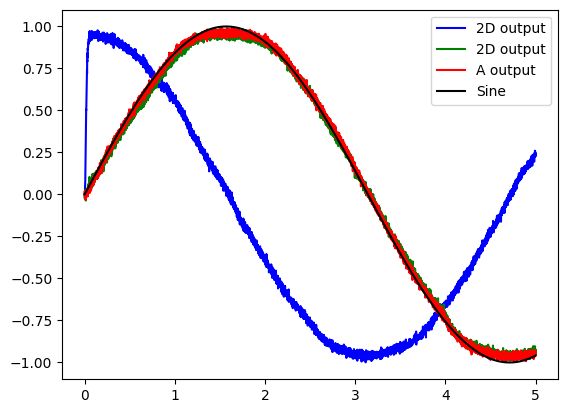Combining¶
This example demonstrates how to create a neuronal ensemble that will combine two 1-D inputs into one 2-D representation.
[1]:
%matplotlib inline
import matplotlib.pyplot as plt
import numpy as np
import nengo
Step 1: Create the neural populations¶
Our model consists of three ensembles, two input ensembles and one 2-D ensemble that will represent the two inputs as one two-dimensional signal.
[2]:
model = nengo.Network(label="Combining")
with model:
# Our input ensembles consist of 100 leaky integrate-and-fire neurons,
# representing a one-dimensional signal
A = nengo.Ensemble(100, dimensions=1)
B = nengo.Ensemble(100, dimensions=1)
# The output ensemble consists of 200 leaky integrate-and-fire neurons,
# representing a two-dimensional signal
output = nengo.Ensemble(200, dimensions=2, label="2D Population")
Step 2: Create input for the model¶
We will use sine and cosine waves as examples of continuously changing signals.
[3]:
with model:
# Create input nodes generating the sine and cosine
sin = nengo.Node(output=np.sin)
cos = nengo.Node(output=np.cos)
Step 3: Connect the network elements¶
[4]:
with model:
nengo.Connection(sin, A)
nengo.Connection(cos, B)
# The square brackets define which dimension the input will project to
nengo.Connection(A, output[1])
nengo.Connection(B, output[0])
Step 4: Probe outputs¶
Anything that is probed will collect the data it produces over time, allowing us to analyze and visualize it later.
[5]:
with model:
sin_probe = nengo.Probe(sin)
cos_probe = nengo.Probe(cos)
A_probe = nengo.Probe(A, synapse=0.01) # 10ms filter
B_probe = nengo.Probe(B, synapse=0.01) # 10ms filter
out_probe = nengo.Probe(output, synapse=0.01) # 10ms filter
Step 5: Run the model¶
[6]:
# Create our simulator
with nengo.Simulator(model) as sim:
# Run it for 5 seconds
sim.run(5)
Step 6: Plot the results¶
[7]:
# Plot the decoded output of the ensemble
plt.figure()
plt.plot(sim.trange(), sim.data[out_probe][:, 0], "b", label="2D output")
plt.plot(sim.trange(), sim.data[out_probe][:, 1], "g", label="2D output")
plt.plot(sim.trange(), sim.data[A_probe], "r", label="A output")
plt.plot(sim.trange(), sim.data[sin_probe], "k", label="Sine")
plt.legend()
[7]:
<matplotlib.legend.Legend at 0x7f80a4211a60>

The graph shows that the input signal (Sine), the output from the 1D population (A output), and the 2D population (green line) are all equal. The other dimension in the 2D population is shown in blue.